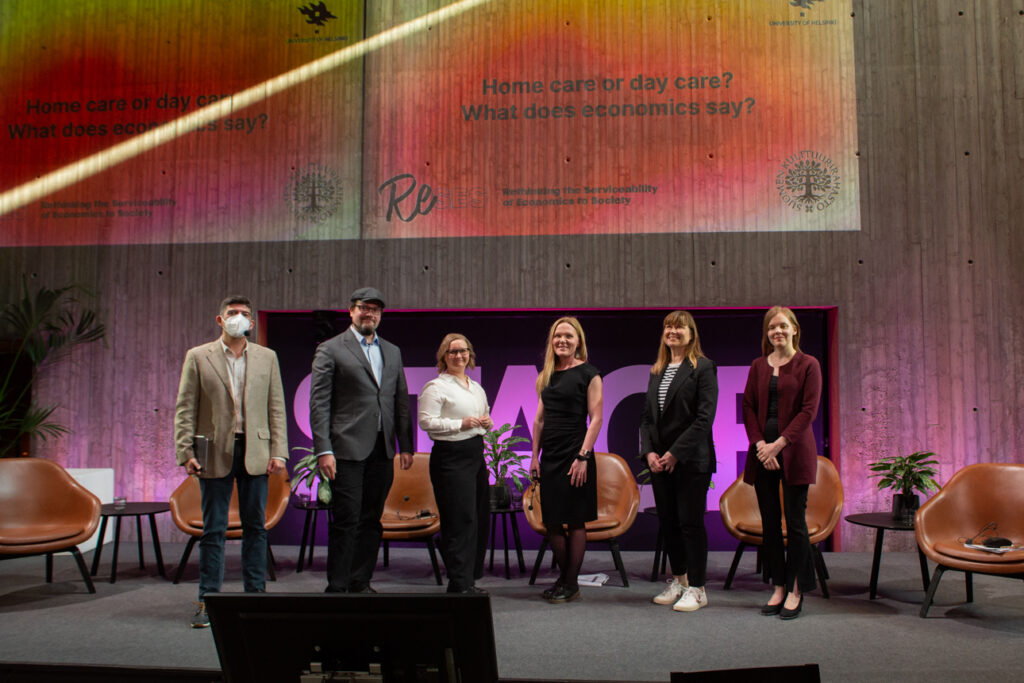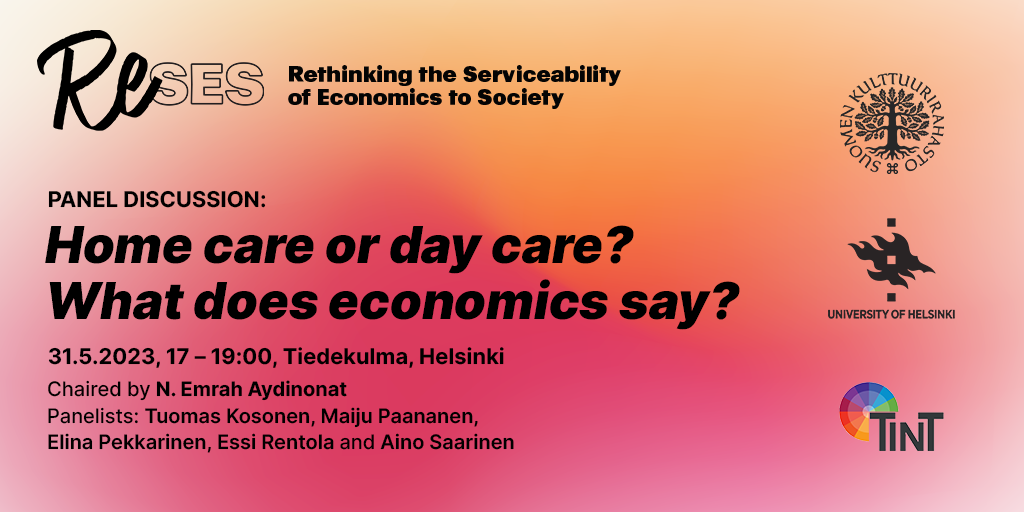
Time: 31st May, 17-19
Place: Tiedekulma Stage, Yliopistonkatu 4, Helsinki
Link to stream: https://tiedekulmamedia.helsinki.fi/fi/web/tiedekulma/player/webcast?playerId=99487739&eventId=23467128

What is the best place for children under 3 years to spend their days? Home care or day care? What does economics say? Since 1985, Finland has been paying home care allowance to parents who would like to take care of their children at home. Economics research suggests that this policy is harmful for mothers, their children, and the labor market. Should Finland abandon home care allowance based on these findings? Can we rely only on economic expertise when evaluating child care arrangements?
Please join us at a panel discussion on the economics of home care allowance, featuring Tuomas Kosonen (VATT), Maiju Paananen (Faculty of Education and Culture, Tampere University), Elina Pekkarinen (Ombudsman for Children in Finland), Essi Rentola (Ministry of Social Affairs and Health) and Aino Saarinen (University of Helsinki). The panel will be moderated by N. Emrah Aydinonat (University of Helsinki).
Panelists:
- Tuomas Kosonen (VATT)
- Maiju Paananen (Faculty of Education and Culture, Tampere University)
- Elina Pekkarinen (Ombudsman for Children in Finland)
- Essi Rentola (Ministry of Social Affairs and Health)
- Aino Saarinen (Department of Psychology and Logopedics, University of Helsinki)
Chair: N. Emrah Aydinonat (Faculty of Social Sciences, University of Helsinki)
The event will be in English.
Participate either in person or online
More information:
The world looks up to Finland not only because it consistently ranks at the top of happiness indexes but also because it is considered one of best countries to be a parent. At least as world sees it, Finland’s institutional structure supports the parents is several ways, takes good care of the less well-off, and aims at giving an equal start to every child regardless of their background.
The child home care allowance, which is paid to parents with a child under 3 years of age who is not in day care, is commonly thought as a part of this institutional structure. Home care allowance gives parents the option to take care of their newborn at home instead of sending their child to day care at an early age.
Recently, the benefits of home care allowance have been called into question. In 2021, Ministry of Economic Affairs and Employment published a report by a working group of researchers on employment, which suggested abolishing the home care allowance, based on the finding that it negatively affects women’s participation in the workforce.
A recent working paper published by the National Bureau of Economic Research argues that home care allowance has negative consequences both for mothers and children. Particularly, the paper argues that it “decreases maternal employment” and “negatively affects the early childhood cognitive test results of children, decreases the likelihood of choosing academic high school, and increases youth crimes.”
The question is: should Finland abandon home care allowance based on these finding? If so, how? If not, why?
In this panel discussion, we hope to provide
- A clear explanation of the research findings on home care allowance, which will not require a background in economics and statistics.
- Answers to your questions regarding both the home care allowance system, the policy implications of this research, and the debate about home care allowance in general.
- An exploration of the broader social and economic implications of the home care allowance, including its impact on gender equality, labor force participation, and child development.
- A consideration of the ethical and moral dimensions of the home care allowance, including questions about the role of government in supporting families and the value of different forms of child care.
—
We will publish a recording after the event on Youtube.
This event is a part of the “Rethinking the Serviceability of Economics to Society (ReSES)” project, which organizes events on economics and the relationship between economics and society in 2023-2024. This Argumenta project is funded by the Finnish Cultural Foundation.
For more info and other upcoming events:
🐦 https://twitter.com/resesargumenta
🎥 https://www.youtube.com/@resesargumenta
👤 https://www.facebook.com/reses.argumenta


